About the Author
Erick Kenneth French
For the latter group, here’s the most important thing to know: this book will either open your mind in ways it never has, or validate your heart in ways it’s never been. Iphelia combines practical psychological principles with self-evident spiritual truth. It’s an archetypal story and a self-help manual. And it has pictures and poetry and quotes! There’s even a glossary of feelings! It’s an adhesive-bound, feeling-inspired, wisdom-truth-meaning-extravaganza! And, it’s got dragons.

All about Erick
(CliffsNotes of the Reader’s Digest Version)
The Navy
In the summer of 1992, I was working as waiter at TGI Friday’s struggling to pay off student loans from my first failed college attempt. I felt stuck in my job, stuck in a relationship, and stuck within myself. So after successfully glorifying the idea with analogies to all the Star Trek, Next Generation episodes I had been watching late at night, I enlisted in the United States Navy. Star ships and Navy ships have a lot in common. They have captains, lieutenants, and officers. They have bulkheads, decks, cabins, bridges, and mess halls. But sailors are soldiers and soldiers are hard. We had to be, because we were trained to be. And being emotionally hard doesn’t lend itself to a strong moral compass. All that emotional suppression mixed with in-port alcohol binges generated lots of aggression and sexual obsession. Many found refuge for these energies in places like the Philippines, where brothels abound and one could get 25 pesos for a dollar.
On a ship with a male-only population, women were objectified and my shipmates related to each other with an Alpha-Omega, survival-of-the-fittest mentality. This primitive regression became most apparent to me after witnessing a division meeting in the galley led by the Executive Officer. Someone from our sleeping quarters had something stolen from their locker. What started as a discussion digressed into a shouting match until finally one notoriously fearsome sailor declared, “I say if you’re stupid enough to leave your locker unlocked then you deserve to have your shit stolen!”
The Executive Officer panned the room. “Everybody good with that?”
A series of approving grumbles and it was over.
Our mission at the time was to patrol the Persian Gulf to enforce sanctions on Iraq for its attempted invasion of Kuwait. We were there to keep Iraq from stealing. In that moment—all hands packed into the galley to have thievery amongst ourselves justified—it became very clear to me that the US Navy was not the Federation and the USS Vandegrift was not the USS Enterprise.
Navy life was very difficult for me. Everything that mattered was concrete and measurable. Authority seemed to have been bestowed upon those who were most tolerant of mindlessly obeying orders. Respect was appointed, not earned. When I first arrived on the ship, I was advised to get a pocket knife to keep on my person at all times. When I asked, “What for?” I was told it was a deterrent. “So nobody fucks with you.”
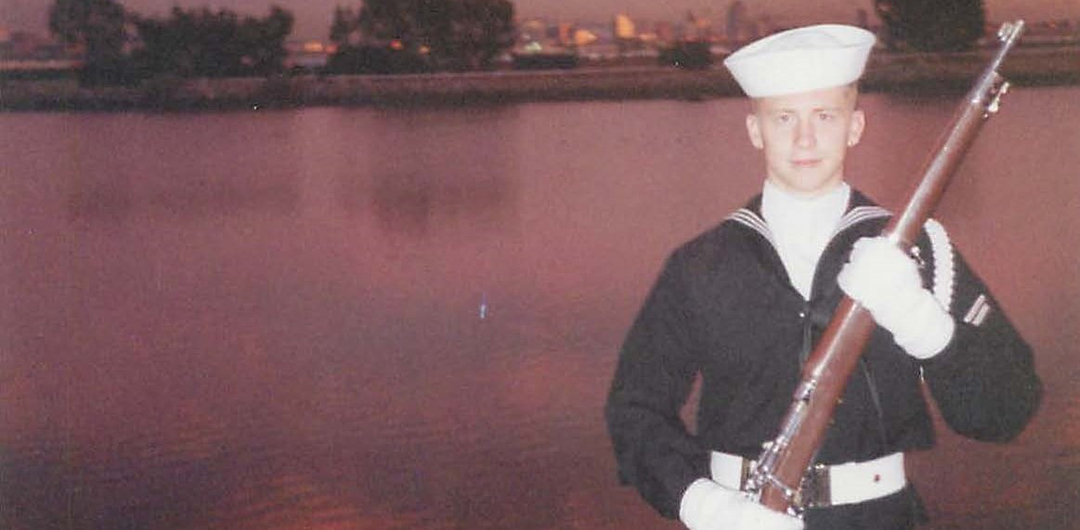
Posing on the beach at Coronado Island after a colorguard exercise.
India
In October of 2005 I made my first pilgrimage to India. No reservations or tour guides—just me, my backpack, the latest edition of Lonely Planet India, and some travelers checks. I was two years post-completion of my master’s degree in Social Work, had just finished my supervision hours, and passed my clinical licensure test. On paper, I was finally ready to “be a therapist!” But in my heart I felt uninspired and unprepared. The rigors of academia coupled with all the placating and posturing for professors, supervisors, and everyone else I believed held the keys to my dream had emptied out my soul. I started out wanting to set people free, and though my college experience had strengthened my sense of efficacy and sharpened my intellect, I felt the journey toward state-sanctioned legitimacy had slowly narrowed the creative expression I so passionately felt would empower me to help people. So I quit my in-home therapist agency job, sold my house and most of my stuff, and got on a flight to India.
India was magical. Never in my life had I been immersed in an environment so visually, auditorily, and aromatically stimulating, and paradoxically, felt so free from the pull of my senses—so spiritually liberated. My time in India began with a sense of warmth and togetherness and, after a month of ashram life at Prashanti Nilayam, culminated in a very palpable realization: everyone and everything is one, and everything is love. It sounds cliche as I type it now, but during heightened moments of meditation-induced euphoria, it was fact—like physics fact, gravity pulling down or the sun warming and bringing life to everything on the planet—fact.
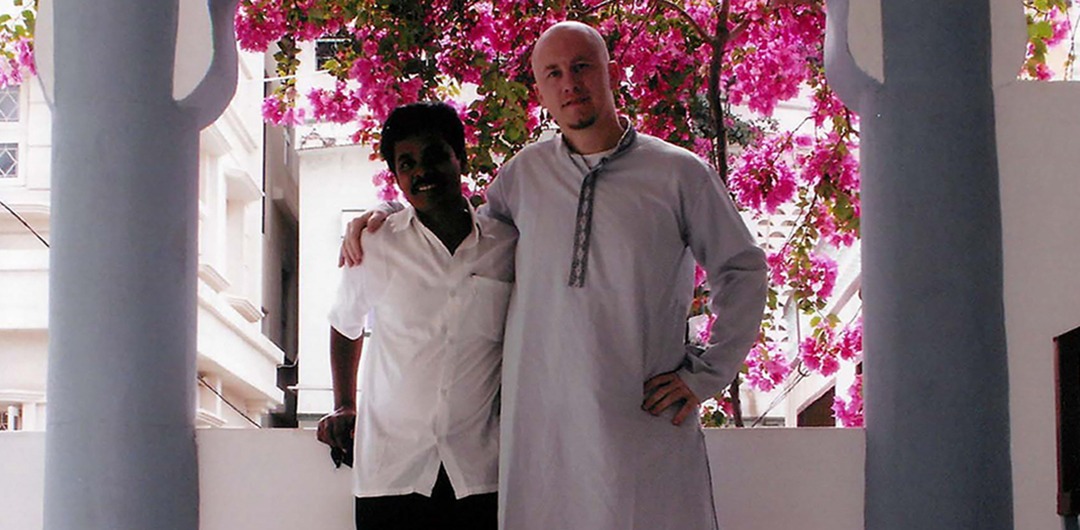
My kind and gentle friend, Bayana, whom I will always remember, took very good care of me during my stay in India.
Coming home from India I felt I knew “the way.” I meditated every morning. Somedays I would begin meditation at 4 am and get up and on with my day at 10 am. YES, that’s six hours of sitting in silence! But despite my efforts, as the weeks and months passed, the euphoria—the feeling of love-and-connection-with-all—slowly faded. I was desperate. I didn’t understand. Why couldn’t I feel it anymore: the peace, the love, the connection?
The Iphelia Moment
Gradually I returned to my Western world lifestyle, which for me consisted of rescue-style love addiction, regular media consumption, and obsessive professional ambition. On the surface I looked like I was doing everything right. I meditated everyday, I was loving and kind—I never got mad. I even ate vegetarian. But deep inside, unbeknownst to me, was a wounded little boy who desperately longed to be loved. On the outside I was the hero and the saint. On the inside I needed to be needed so I could feel worthy and never be abandoned. In time I managed to create a big glaring mess for myself. I got married for all the wrong reasons, became very unconsciously invested in the appearance of my life, and lost sight of any meaningful essence in my world. I felt depressed and defeated. Eventually I would come to realize that I was bogged down with a lot of emotional energy that was not my own. I didn’t have healthy emotional boundaries. I thought that feeling for others was loving them and helping them, but I was suffering. I believed the story I was telling myself, but my body was telling me I felt drained and exhausted. I propped myself up for as long as I could until the facade came tumbling down in a heap of heartbreak, disappointment, and scandal, which culminated in one powerful moment of long overdue angry release. I broke furniture, my phone, and nearly broke my leg.
It was during all that confusion that I first had the idea for Iphelia. I was trying to make sense of why I felt the way I did. Why I couldn’t make my marriage work. Why I didn’t trust the people closest to me. Why I was so tired. Why I didn’t feel like myself. In the midst of all these questions I began to suspect that a lot of what I was feeling was not mine…and that the feelings that were mine were trying to tell me something.
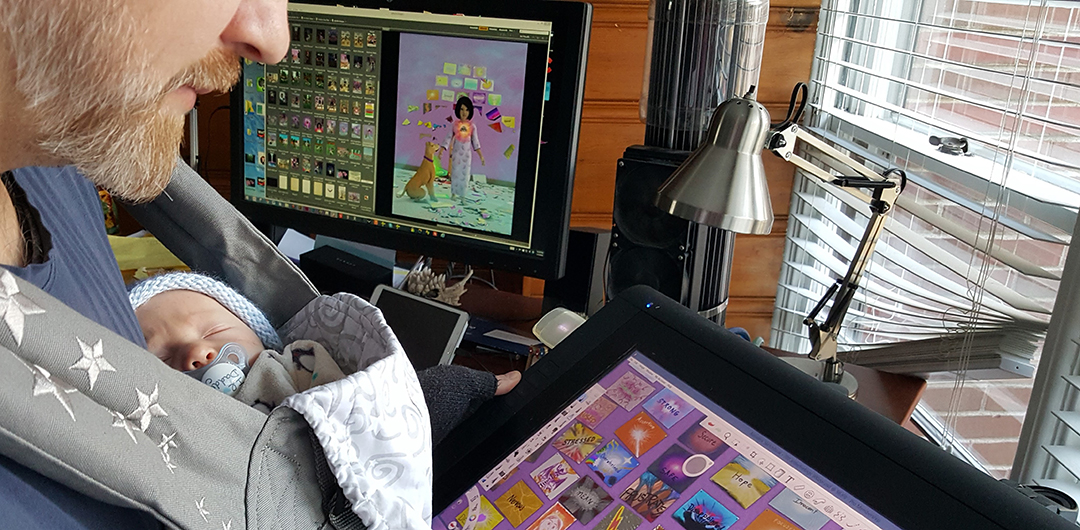
For years I sat at this workstation working on these images trying to validate experiences that only made sense in my heart.
Wellness
That imperative drama happened in the spring of 2010. Eventually I had what vulnerability researcher Brene Brown refers to as a “spiritual awakening.” But the awakening didn’t come until summer. The spring was definitely the breakdown. I was depressed and tired—tired of helping, tired of being a therapist, tired of pretending I was good. I eventually sought to heal myself under the guise of getting more training. I enrolled in a six-day Heart Centered Hypnotherapy training.
During that training we were required to practice on each other and do our own work. This involved entering a trance state and tapping into feelings that had long been repressed. Feelings were stored in my body that I didn’t even know were there. Long story short: I laughed, I cried a lot, and I raged even more. I released a bunch of pent up feelings that I had been walking with for years. By the end of the six days I was tired but I felt alive—more alive than I had felt in years. On the drive home I noticed my eyesight was crystal clear. The views of nature from the highway were more beautiful. Everything was more detailed and the colors were more vivid. My sense of smell had more range and I could hear more in the music I was listening to. I also felt a sense of clarity about my life. Things made more sense and the ambivalence I was feeling about a major struggle in my life had vanished. Everything was clear. I knew what I needed to do and I resolved to do it.
That first week of training marked the beginning of what has to date been seven years of ongoing training and healing through the Wellness Institute. Four to seven times a year I traveled to Seattle and met therapists from all over the country to study and practice with each other. I assisted teaching another internship. I even met a group of therapists from different internships in the Sedona, Arizona, desert to participate in a Vision Quest facilitated by indigenous elders from local Cherokee, Lakota, and Havasupai tribes. After three years of training I began teaching my own Personal Transformation Intensive groups. In the first group I was astonished to witness my clients making more progress in a few weekends than they had made in many years of visits to my office. As I continued teaching and learning through observing my students’ rapid growth and healing, I began to write about the pictures I had by then been drawing for years. Those writings would become the bone structure of what is now the didactic portion of the Iphelia manuscript.
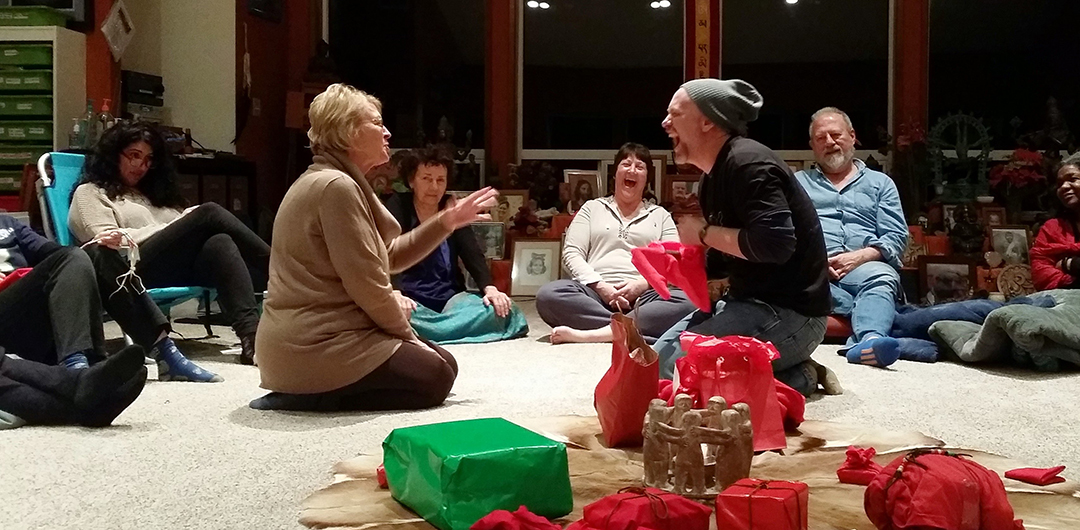
Having a big laugh with students and teachers during a closing ceremony at the Wellness Institute.
Integration
These three passages: The Navy, India, and The Wellness Institute, have afforded me starting points—points of reference—that have helped me make sense of my own feeling-world. The Navy experience immersed me in a concentrated world of emotional suppression. The India experience, though in many ways enlightening, opened me up to a boundarylessness that was fruitful during deep dives of meditation and introspection, but those untested spiritual ideas lead to unhealthy codependent ways of relating in my personal relationships. Finally, my training at the Wellness Institute coupled with continuous learning with my students has afforded me the opportunity to distill a balance within myself while experimenting with and supporting others in doing the same.
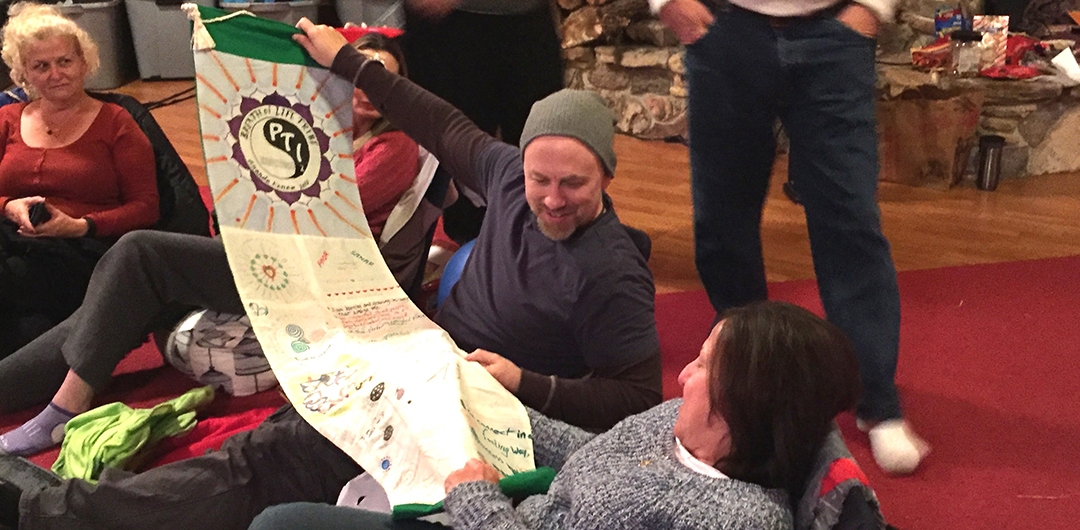
The Iphelia manuscript contains much of what I believe I know, for sure, to be true. So far.
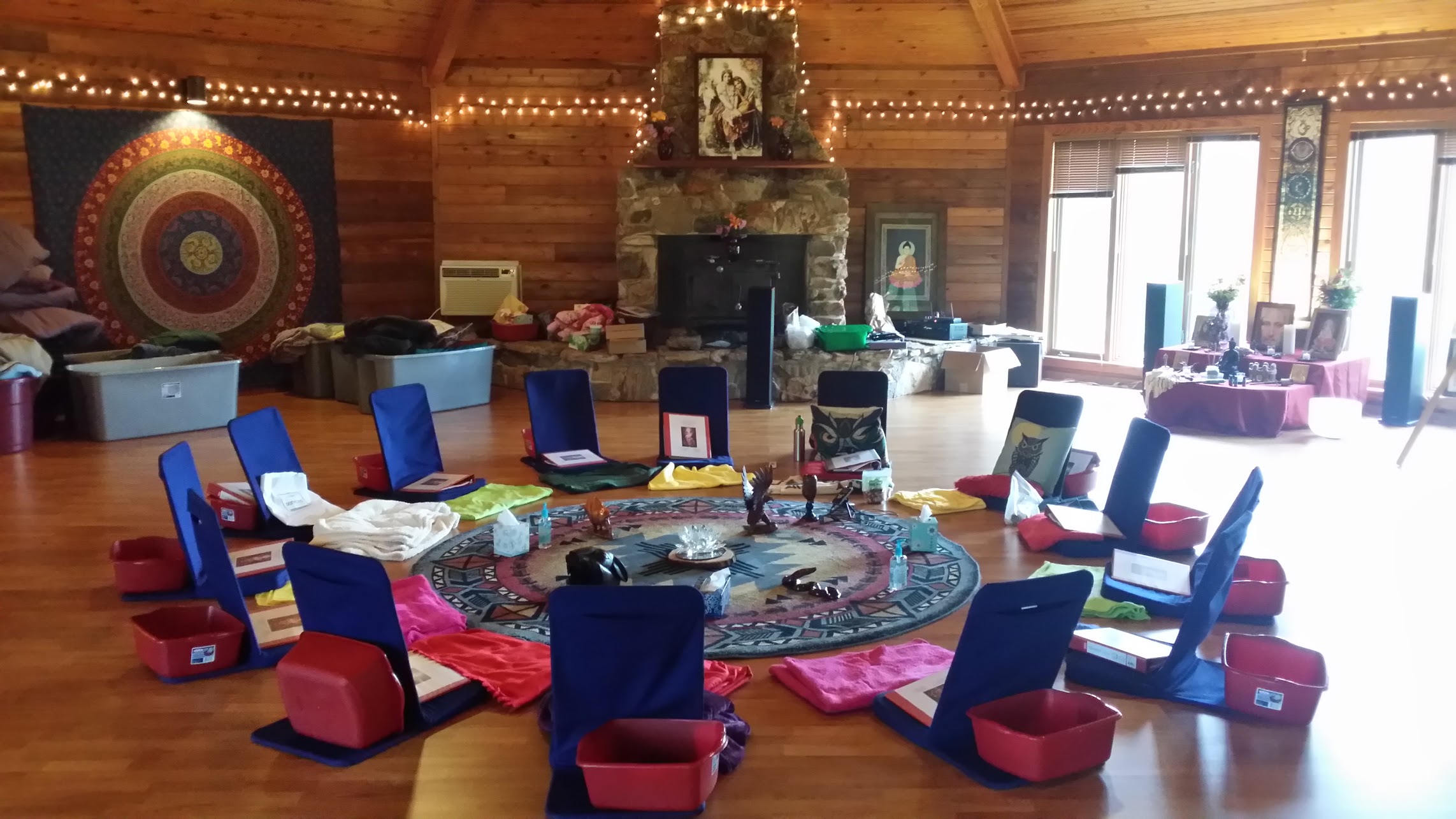
The classroom at one of our Personal Transformation Retreats. We sit in a circle where everyone is equal, everyone has a voice, and everyone is worthy of being truly seen and heard.
See Erick on YouTube @EmpathyKnows
© 2021 Erick Kenneth French

